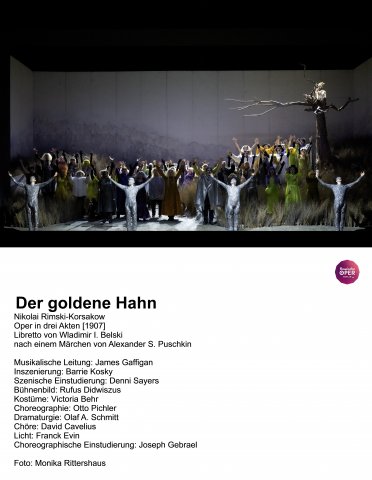The Golden Cockerel at Komische Oper, Berlin
Der Goldene Hahn by N. Rimsky-Korsakov
By: Angelika Jansen - Jan 31, 2024
Der Goldene Hahn by Nikolai Rimsky-Korsakov at the Komische Oper, Berlin
Barrie Kosky, former director at the Komische Oper, Berlin, directed Nikolai Rimsky-Korsakov's last opera Der Goldene Hahn (The Golden Cockerel at the Schiller Theater, the temporary house of the Komische Oper during its renovation. It is based on a poem by Alexander Puschkin. In typical Kosky fashion, it turned into a turbulent and over the top affair with unexpected highlights.
King Dodon (Dmitry Ulyanov) is given a golden rooster by an astrologer (James Kryshak) with the promise that this cockerel will crow when danger is imminent. The wary king is happy in his lazyness and enjoys sleep in abundance. All changes though: War is coming, his two sons kill each other over the beautiful queen of Schemacha (Kseniia Proshina) and King Dodon succumbs to her allure as well. Then he goes to war and wins. But, in the end he is killed by the cockerel.
All the frantic action, sung in Russian with translations beamed onto the ceiling, plays out in a fabulous stage setting of a high grass steppe by Rufus Didwiszus. Barrie Kosky has directed the play by Wladimir Belski as a tour de force with the lively happenings taking place around the slumbering king. The ballet sets ominous accents when all appear as gray horses and then silly en pointe dancing as glittering cherubs. The role of the golden rooster is sung gracefully by Julia Muzychenko and played as sitting on a barren tree by Daniel Daniels Ojeda Yrureta. Ksenia Proshina's soprano is wonderful and she also looks beautiful as queen of Chemacha.
King Dodon (bass), on the other hand, is clad in underwear and thus looks much more silly than necessary. His part is the only one designed as an eye popping caricature. One wonders whether this also happened at the first long version produced in Paris in 1914. Kosky obviously indulges himself here as director, allows the playful approach to take over into sillyness.
Thankfully, the overall impression remains a kind of mockery in a fairy-tale story, a 'light opera' enjoyment for the senses. Rimsky-Korsakov's score is claimed to be "one of the composer's most sensuous and sumptuously colorful" one, according to the playbill.
It certainly worked, the audience was enchanted.



